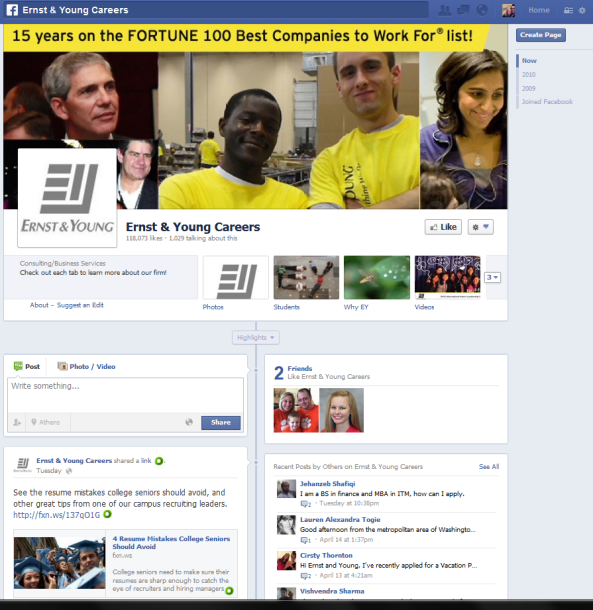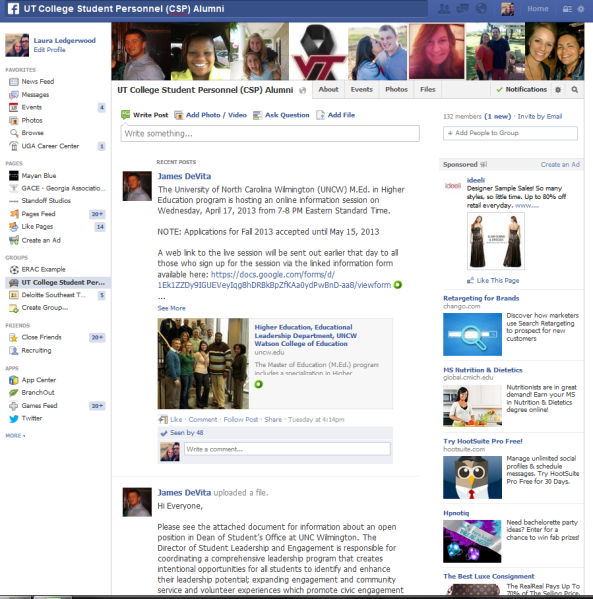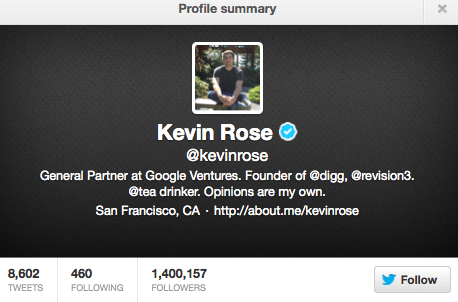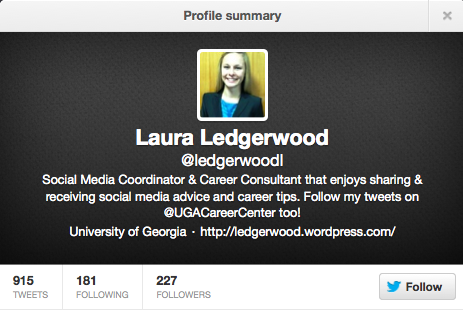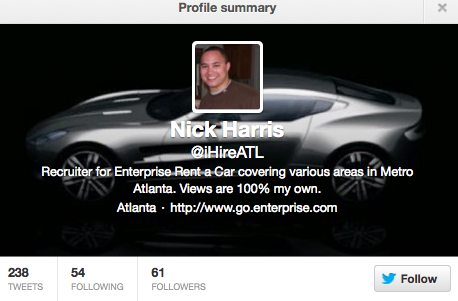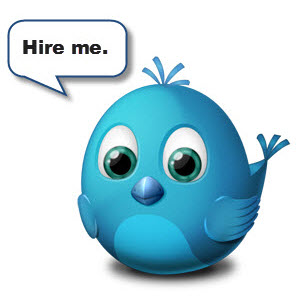 The purpose of Twitter is to share pictures, links and information in 140 characters or less. Love it or hate it, it is an excellent way for you to get connected with people, including those hard to find employers who don’t like to publish their email addresses. Depending on who you follow, it can help you discover new information and build connections. Even if you don’t want to tweet, you can use Twitter to listen. It is used by many individuals to stay abreast of what is going on their industry, and it can be used by you to stay informed.
The purpose of Twitter is to share pictures, links and information in 140 characters or less. Love it or hate it, it is an excellent way for you to get connected with people, including those hard to find employers who don’t like to publish their email addresses. Depending on who you follow, it can help you discover new information and build connections. Even if you don’t want to tweet, you can use Twitter to listen. It is used by many individuals to stay abreast of what is going on their industry, and it can be used by you to stay informed.
Career Exploration
A. Profile – what should/should not be included
Think of your 160 character Twitter bio as your purpose for being on Twitter. Consider including your full name, major, when you graduate and your future career goals. It is okay to include some of your hobbies, but if you plan on using this to interact with other Twitter users for career purposes, critically think about how you are presenting yourself through your bio.
Here are two examples:
- Student at the University of Georgia, Anthropology major, Soccer player, & VP of DZ. Seeking an internship in a museum or national park.
- UGA 2015 Advertising Student|New Media Fan|Traveler|Photoshop/InDesign Wizard|Future Graphic Artist & Journalist. Visit my blog: http://www.professionalblog.com
B. How to Research Careers
A good place to start is to identify Twitter users that put out useful career-related content. Visit www.twellow.com or www.wefollow.com and look for industry leaders in careers you are considering. Type a few different terms into the search bar like “career information” or “[industry] careers” and follow users that share information about their industry. You can also follow general career advice accounts, like Heather Huhman’s shown below.
It also wouldn’t hurt to ask directly questions to users. Here’s a sample tweet of how to do it:
@username How did you break into your career? Any advice for a current UGA student?
Before asking a question like the one above, build the relationship by commenting on the Twitter users posts or sharing information you think would be relevant to them.
Another way to explore careers is to read job postings listed on Twitter. There are some companies that have accounts dedicated to solely posting jobs. In addition, you can type in “[industry] jobs” and look to see if there is an account that posts positions in that field.
C. Case Study
Lillian is a sophomore Advertising major at UGA. She wasn’t sure what she wanted to do after she graduated, so she set out to identify UGA alumni who were advertising majors on Twitter and follow them. After commenting on a few of their posts, she reached out directly to ask for advice. Though some alumni did not get back to her, she had a few that told her to direct message her email and phone number to connect for an informational interview. After a few of these conversations, she was able to get a better sense understanding of the various career paths in advertising and what would be the best fit for her.
Job Searching & Networking
A. Ways to do it
Do you want to know the number one way UGA students find employment? Year after year, networking is at the top of the list. The goal of networking should be to build reciprocal relationships in which both parties benefit. It isn’t something only the well-connected can do. Twitter and social media can be used to create a network and manage your built-in networks that consist of friends, family professors, and anyone that you meet.
Here are a few quick tips to get started:
- Identify users that have something in common with you: UGA, hobbies, extracurricular involvement or industry interests.
- Create “lists” to keep your Twitter followers organized.
- Share relevant industry news and information with your followers.
- Comment on what others post to help you build a relationship.
- Follow accounts that tweet job listings.
B. General Tips
- Keep your Twitter profile public so that others can follow and interact with you.
- Don’t forget that everyone can see what you post. Think before you tweet.
- Do share relevant information relevant to your career goals.
- Don’t over tweet. Your followers will stop following you if you post too often.
- Know that you don’t have to tweet often, but if you do, you are more likely to have people reply to your posts and want to follow you.
- Build your network before you need it. Don’t be “that guy” who only contacts people when they want something.
- It’s ok to post things outside of your future career interests, but don’t overdo it.
- Think of your Twitter profile as a billboard. If you wouldn’t want your tweet plastered on a sign by the highway, don’t post it.
- Follow hashtags and engage in chats.
- You have to give to get. Comment on what others post if you want to get noticed.
C. Sample Communication
There are many ways that you can use Twitter to communicate with potential hiring managers. Below are a few examples:
Follow up after an application
@companyname I just applied for the ______ position with your company. I would love to work there and would be glad to answer any questions if you have any.
To get noticed by an individual recruiter
@recruitername Any advice on what I can do to make myself more competitive for future internships? Here’s my LinkedIn: http://linkd.in/18WJYOe
@recruiter Thanks for sharing that article! I am interested in breaking into that industry and found it helpful.
Showcase your industry knowledge
Here’s a great article on the future of cloud computing: http://bit.ly/10ugvI6 #IT #ITcareers
D. Case Study
Lydia May is a 2nd year student at UGA and is considering a career in either Journalism or Advertising. She used Twellow and WeFollow to identify Twitter users to follow that tweeted about her careers of interests and then took it a step further by looking at what Twitter accounts these top accounts followed. Eventually, it became hard to keep up with all the people she was following, so Lydia created an Advertising Twitter List and a Journalism Twitter list to help her keep her information organized.
By following these industry leaders, she identified accounts that tweeted jobs of interest to her. She also was able to get advice from employees working at companies she is considering applying to for internships by asking when she should start applying and where she should look. Doing this helped her make sure she didn’t miss important application deadlines and it even gave her a leg up on her competition. Because she had established these industry relationships early, her name was passed along directly to the hiring manager and ultimately got hired.



